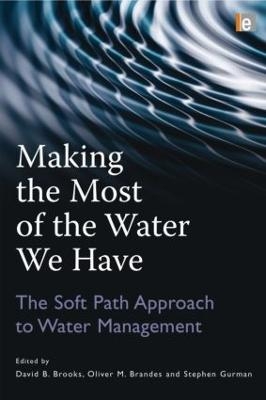
Making the Most of the Water We Have
Earthscan Ltd (Verlag)
978-1-84971-308-5 (ISBN)
Based on the 'soft path' approach to the energy sector, a transition is now under way to a soft path for water. This approach starts by ensuring that ecosystem needs for water are satisfied and then undertakes a radical approach to reducing human uses of water by economic and social incentives, including open decision-making, water markets and equitable pricing, and the application of super-efficient technology, all applied in ways that avoid jeopardizing quality of life. The soft path for water is therefore a management strategy that frees up water by curbing water waste.
Making the Most of the Water We Have is the first to present and apply the water soft path approach. It has three aims:
to bring to a wider audience the concept and the potential of water soft paths
to demonstrate that soft path analysis is analytical and practical, and not just 'eco-dreaming'
to indicate that soft paths are not only conceptually attractive but that they can be made economically and politically feasible.
Includes a tool kit for planners and other practitioners.
Published with POLIS Project and Friends of the Earth
David B. Brooks was Canada's first Director of Energy Conservation, and later spent 15 years with IDRC (International Development Research Centre) on overseas projects on energy, water and natural resource management. He was one of the founders of Friends of the Earth Canada and now serves as its Senior Advisor - Fresh Water. Oliver Brandes is Water Sustainability Project Leader and Associate Director at the POLIS Project on Ecological Governance, University of Victoria, Canada. Stephen Gurman is an environmental consultant and writer, based in Ottawa, Canada.
Introduction 1. Why a Water Soft Path, and Why Now Part 1: Water Soft Paths as Human Vision 2. Avoiding the Perfect Storm: Weathering Climate Change by Following its Effects on Water Resources 3. In the Beginning: Soft Energy Paths 4. Getting it Right: Misconceptions About the Soft Path 5. Practising Ecological Governance: The Case for the Soft Path for Water 6. Water Policy in Canada: Changing Course for the Soft Path Part 2: Water Soft Paths as Analytical Method 7. Getting Quantitative: The Canadian Water Soft Path Studies 8. Turning Principles into Practice: The WSP Scenario Builder 9. Thinking Beyond Pipes and Pumps: Water Soft Paths at the Urban Scale 10. WSP Analysis at a Watershed Scale 11. WSP Analysis at a Provincial Scale Part 3: Water Soft Paths as Planning Tool 12. Removing Institutional Barriers to Water Soft Paths: - Challenges and Opportunities 13. Pushing the Boundaries: Shifting Water Soft Paths Philosophy towards Hard Policy in Municipal Water Management 14. Green Buildings and Urban Space 15. Water Soft Path Thinking in the United States 16. Water Soft Path Thinking in Other Developed Economies – A. England B. The European Union C. Australia 17. Water Soft Path Thinking in Developing Countries – A. South Africa B. India C. Middle East and North Africa. Conclusion 18. A Water Future Different from the Past. Annex: How to Create A Soft Path Plan For Water. Index
| Erscheint lt. Verlag | 21.3.2011 |
|---|---|
| Verlagsort | London |
| Sprache | englisch |
| Maße | 156 x 234 mm |
| Gewicht | 408 g |
| Themenwelt | Naturwissenschaften ► Biologie ► Ökologie / Naturschutz |
| Sozialwissenschaften ► Soziologie ► Spezielle Soziologien | |
| Technik ► Bauwesen | |
| Technik ► Elektrotechnik / Energietechnik | |
| Technik ► Umwelttechnik / Biotechnologie | |
| Wirtschaft ► Volkswirtschaftslehre | |
| ISBN-10 | 1-84971-308-1 / 1849713081 |
| ISBN-13 | 978-1-84971-308-5 / 9781849713085 |
| Zustand | Neuware |
| Haben Sie eine Frage zum Produkt? |
aus dem Bereich


